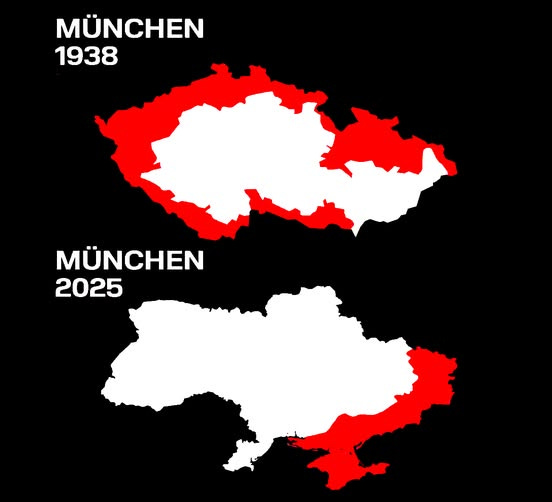The Message from 1938: Dissolve Ukraine!
by Karl Richter
Karl Richter argues that the German media’s comparison of current Ukraine negotiations to “Yalta 2.0” is misplaced, emphasizing instead that the real parallel lies with the Munich Agreement of 1938, as both situations involve rectifying historical injustices related to national borders and self-determination.
As negotiations loom for resolving the Ukraine issue, the German media bark at the ghost of “Yalta 2.0” — a reference to the Yalta Conference in February 1945 where the “Big Three” — Stalin, Roosevelt, and Churchill — settled the post-war world order.
However, this comparison misses the mark. The current focus is solely on Ukraine and the long-overdue resolution of a conflict that was foolish and suicidal, especially for Ukraine itself. U.S. President Trump is absolutely correct in blaming Kiev for starting the war nearly three years ago, reminding them, “You should have never started it. You could have made a deal.” Everyone knows this, except, of course, the German mainstream media. Anyone with a clear mind could understand as early as 2022 that Russia could not tolerate a NATO appendage at its doorstep. Now, the end is in sight, and the lamentation is loud. It is to be hoped that Ukraine will now be sustainably neutralized as a source of unrest. Otherwise, the war will “heat up” again in a few years. Trump seems to realize this as well.
Thus, the proper historical comparison is not Yalta but the Munich Agreement of 1938. Czechoslovakia, established by the Western powers after World War One as a frontline state against Germany, harassed the Germans who had been living in the Sudetenland for centuries in a similar way that Ukraine has harassed the ethnic Russian population in the Donbas. Hitler, in cooperation with Great Britain, France, and Italy, swiftly incorporated the Sudetenland with its 3.3 million Germans. Therefore, the annexation of Crimea in 2014 was as justified as the reintegration of the Donbas now.
The good news is that the Yalta post-war order is obsolete. None other than the U.S. President is currently setting aside the long-jealously guarded principle of the immutability of borders. For eighty years, Europeans have been deceiving themselves. Of course, borders can be changed if they are unjust and trample on the right of peoples to self-determination. This was the case in Czechoslovakia after 1918 as much as in the artificial state of Kiev after 2014. But no injustice lasts forever — a good message for us Germans, too. It’s finally getting interesting again.
(Translated from the German)




That's a very bad comparison. The state borders between Czechoslovakia and Germany were the oldest in Europe. The Czech Kingdom has always been a clearly defined nation state entity. What only changed was the extent of German settlement in Czech lands. Czechoslovakia in this respect was not a new or artificial state like post - soviet Ukraine, where it is not quite clear where it should begin and where it should end, nor who is still Ukrainian and who is still Russian. What was very new, on the contrary, was the concept of the so-called Sudetenland (used first in the 1890s), which had no geographical or historical justification. Their separation from Czechoslovakia meant the destruction of the independent Czech state. This fact was recognised by the Nazis themselves after the occupation of the rest of Bohemia and Moravia. This situation was very different from Ukraine which has never been a truly independent state (exept for a brief period of time in the 17th century and perhaps a few month after WWI). The treatment of the Czech Germans was also very decent in the conditions of interwar Europe. For a long time Czechoslovakia had relatively good relations with interwar Germany, among other things because they had no territorial disputes. That changed only with the rise of the Nazis.
Lately the issue of blocking troops troubles me. Those who shoot the hapless Ukraine conscripts not allowed to surrender or retreat. Never mind be properly buried once their inevitable fate arrives.
Yeah its well past time these blockers and recruiters too, found their way to the front lines. Not to wind up waiting in some luxury location, for a call from the CIA! Put your money where your mouth is evil demons! Just a little shout out to Tulsi.
I've long felt many of those cannon fodder are most accurately labeled political opposition. How hard is it to hold civilian family members hostage, until the dad fulfills his "duty". Especially when you already have burning people alive, on your resume.
Sorry off topic, it is an awesome article, but this stuff boils under my skin. If violent threats must be used to raise your national "defense" forces i.e. the draft, perhaps its time to redefine our rights.
The whole idea that ones duty is to sustain conflict so the owners of large industrial interests (and their financiers) can flourish, is repellant.